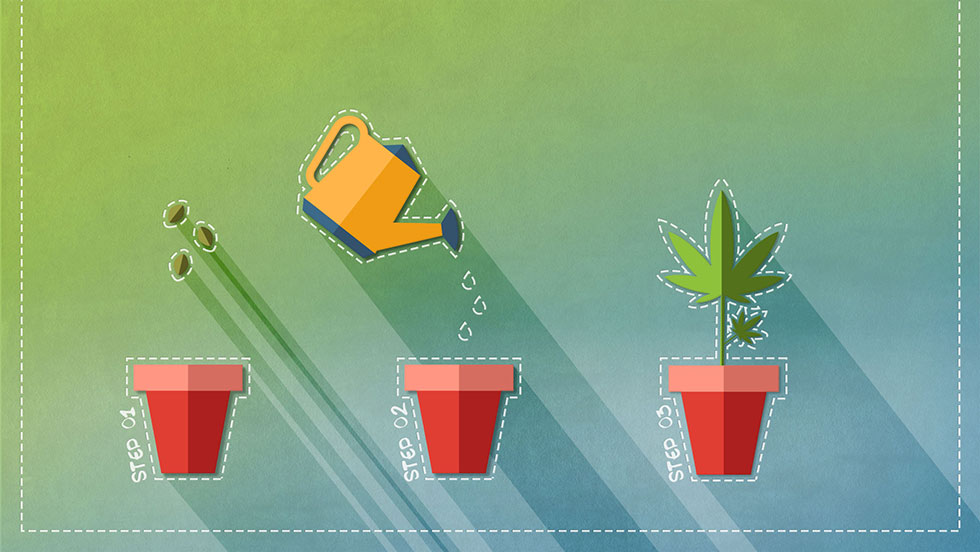6 Beginner-Friendly Steps for Growing Weed at Home

Steps for Growing Weed at Home
Cannabis is a hardy plant that can grow in different climates. And the best bit? The legalization of weed in most states enables cannabis users to grow their favorite strains at home. However, growing marijuana as a beginner comes with some challenges, and you should brace yourself for the task.
Growing your weed at home- What are the gains?
You can acquire your cannabis products from marijuana stores near you. You may not always get the desired products and may be forced to pick alternative strains due to shortages. Growing your weed at home ensures a steady supply of your favorite products and strains all the time.
What’s more? Homegrown weed is cost-effective and will save you a lot of time and money. You may incur some expenses when starting but will save a lot in the long-run. This is particularly true if you choose high-quality seeds and strains. Besides, some seed varieties are high yielding and produce larger buds than others.
To make the right seed choices, check out the different seed varieties from i49. Learn about their growing methods, and also understand all the cannabis regulations in your state. There are different strains to choose from, and growing your weed allows you to pick the best for your needs. Whether seeking cannabis products for recreational or medicinal purposes, you can be sure to get high-quality seeds and strains.
Here are steps to guide you grow healthy cannabis as a beginner:
- Seed selection
There are different cannabis strains; these include the Sativa, Indica, Ruderalis, and many other hybrids. You’ll get all these on any seed company of choice, and picking the best variety can be somewhat confusing.
First of all, know what you enjoy, and pick strains that give you that desired high. If growing cannabis for medicinal purposes, go for strains that have offered great relief from your ailment in the past.
To make more informed choices, share this with the vendor. The team will help you determine the best seeds. If shopping online, go for feminized seeds; they require minimal maintenance and give you all-female plants. Clones are also excellent choices for beginners and are cuttings from female plants.
- Understand the growth fundamentals
The cannabis plant requires a host of things to thrive and offer high yields. These are light, water, nutrients, air, the right temperatures, and more.
Light: Just like other plants, cannabis needs sufficient amounts of light to grow. The plant requires about 18 hours of light daily. If growing your plants indoors, use timers to control this. For outdoor germination, delay this until your plants can withstand over 12 hours of direct sunlight.
Water- Water is essential for all plants, and cannabis is no exception. If residing in states with regular rainfall, your plants will benefit from this. But, if growing big cannabis tree varieties, know that they have high water demands and might need to supplement this. If growing cannabis indoors, pay attention to the water PH. Use a high-quality PH meter to track the PH levels in your water.
Air– Outdoor plants get exposed to fresh air and breeze, allowing for excellent gaseous exchange. If growing indoors, your plants risk getting stale air, invest in an exhaust fan for air improvement, and ensure that your weed plants get fresh air throughout. A still environment will encourage pests, molds, and stunted plant growth.
Temperature- Weed can thrive in both cold and hot climates. But, it may not yield well in extreme climates. For instance, your plant may freeze to death when exposed to very cold temperatures.
It may also not yield as desired in extremely hot weather. Twenty seven degrees centigrade is an ideal temperature for healthy growth. You can achieve this with ease by the use of fans or an air conditioner if growing indoors.
Nutrients- Weed plants require rich soils to thrive. Have a good mix rich in compost, vitamins, living organisms, and minerals. You can mix this by yourself or purchase an organic mix online. Rich soil ensures a steady supply of nutrients for your plants during their entire cycle. Also, water your plants with organic mixes such as molasses and feather meals to improve the soil quality and boost healthy growth.
Humidity- Humidity control is important if growing your cannabis plants indoors. Well, balanced humidity levels ensure a healthy and pest-free environment and also encourages flowering.
- Location & Cleanliness
Grow in a clean, sanitized space to eradicate the risk of pests and contaminants. A dirty space encourages pathogens and bacteria, and it’s advisable to come up with a cleaning routine. Remember, cannabis plants suck everything around them, and the area, air, and soil should stay clean to keep contaminants at bay.
- Starting out- start small
Start with a few plants, probably tow or here. Growing cannabis at home involves a learning period, and you can make many blunders as a beginner. With fewer plants, not much goes to waste. However, you won’t take long to master the trick and enjoy blooming and fuller plants.
- Monitor the growth phases
From planting the seeds to harvesting, growing weed involves various phases. All have varied requirements, and understanding this makes the process easier. For instance, your plants will require adequate lighting during flowering, and you may need to invest in high-quality cannabis grow lights.
On the other hand, the initial stages of growth demand high nitrogen levels for healthy plants. You won’t need nitrogen during the harvesting period, though. Know all the requirements for each stage, and enjoy healthy plants and better yields.
- Harvesting- know when to do it
The best time to harvest your weed is early mornings. Your plant shouldn’t be too wet nor too dry. There are many indicators to signal that your plants are ready for harvest. Although the strains and signs vary, the common signs are;
- Yellowing and curly leaves- some will even fall off
- Plump buds which don’t appear to grow larger
- Heavy& hanging plants
Final thoughts
Growing cannabis at home involves various steps. These include choosing the right seeds and plant location. If not sure where to start, seek ideas from other professional weed-growers, and they will guide you throughout the entire process. Most importantly, pay attention to the seeds’ quality and go for strains to match your needs.






